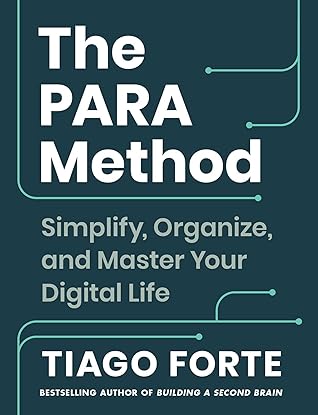More on this book
Community
Kindle Notes & Highlights
by
Tiago Forte
Read between
April 6 - April 15, 2024
You don’t get a prize for starting a book or finishing one. Books are not trophies to collect or evidence you’ve learned anything.
the ultimate system for organizing your life is one that is actionable.
The system you use to organize information has to be so simple that it frees up your attention, instead of taking more of it. Your system must give you time, not take time.
Most of us first learned how to organize information in school. We were taught to categorize our class notes, handouts, and study material by academic subject, such as math, history, or chemistry. Without realizing it, we took that same approach into adulthood. We continued to categorize our documents and files according to incredibly broad subjects like “Marketing,” “Psychology,” “Business,” or “Ideas.” This makes zero sense in your postacademic career.
Instead of organizing information according to broad subjects like in school, I advise you to organize it according to the projects and goals you are committed to right now.
When you break down your responsibilities into bite-size projects, you ensure that your project list is constantly turning over. This turnover creates a cadence of regular victories that you get to celebrate every time you successfully complete a project.
Using PARA is not just about creating a bunch of folders to put things in. It is about identifying the structure of your work and life—what you are committed to, what you want to change, and where you want to go.
So much of what we call “organizing” is essentially procrastination in disguise. We tell ourselves we’re “getting ready” or “doing research,” pretending like that means progress.
The problem with keeping everything is that it quickly starts to consume a resource even more scarce than physical space: your attention. Every time you see all those random files strewn across your computer desktop, Documents folder, cloud drive, or notes app, some of your mental energy gets drained away.
You can keep everything, but you can’t keep it front and center in your attention. It needs a place to go for safekeeping—one that is secure but completely “out of sight, out of mind” until you need it. That place is the Archives. Think of it like “cold storage” for your digital life.
This experience led me to form a new rule: never create an empty folder (or tag, or directory, or other container) before you have something to put in it.
As you reorganize your digital life, I recommend taking this opportunity to reflect on how you want to change your attitude toward information going forward. Don’t dump new stuff willy-nilly into your shiny new PARA folders, or you’ll quickly find yourself right back in the chaos you had in the first place. Think carefully about what you want to save in all four categories of PARA. What is truly unique or useful? What do you need in front of you when you sit down to focus on a project or area? Which resources are truly valuable, and which could you easily find again with a Google search?


